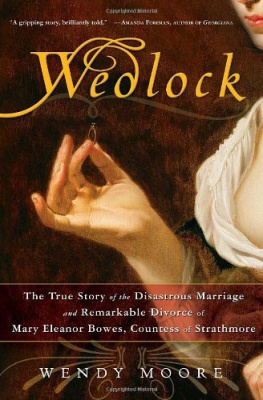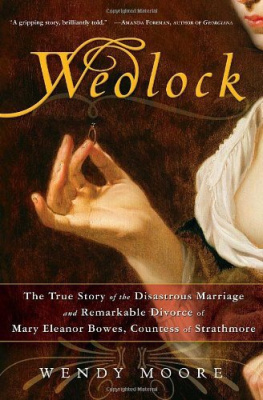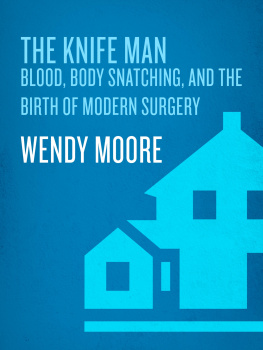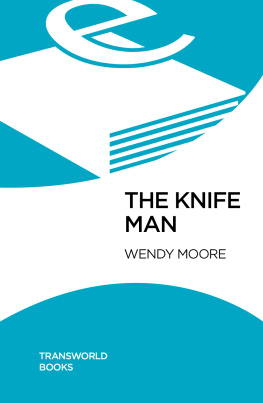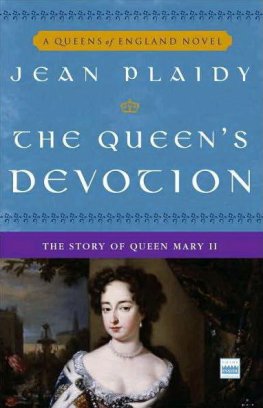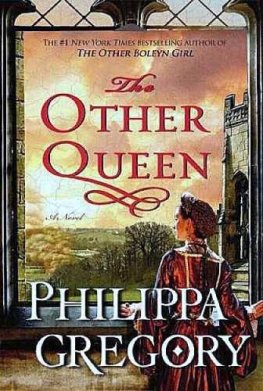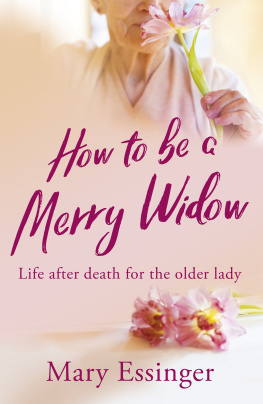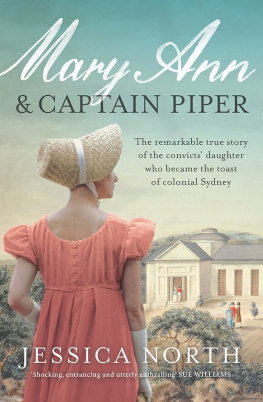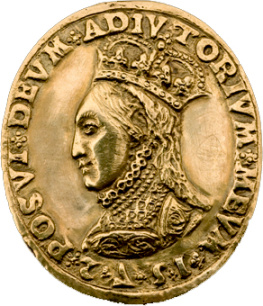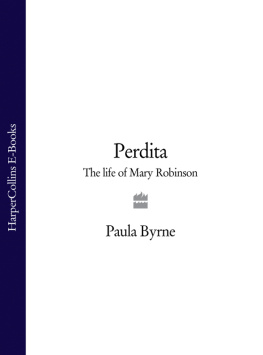Table of Contents
ALSO BY WENDY MOORE
The Knife Man
Wedlock
WENDY MOORE
Orion
www.orionbooks.co.uk
First published in Great Britain in 2009 by Weidenfeld & Nicolson, an imprint of The Orion Publishing Group Ltd Orion House, 5 Upper Saint Martins Lane London, WC2H 9EA
An Hachette UK company
1 3 5 7 9 10 8 6 4 2
Copyright Wendy Moore 2009
The moral right of Wendy Moore to be identified as the author of this work has been asserted in accordance with the Copyright, Designs and Patents Act 1988.
All rights reserved. No part of this publication may be reproduced, stored in a retrieval system, or transmitted, in any form or by any means, electronic, mechanical, photocopying, recording or otherwise, without the prior permission of both the copyright owner and the above publisher of this book.
A CIP catalogue record for this book is available from the British Library.
eISBN : 978 0 2978 5758 7
Typeset by Input Data Services Ltd, Bridgwater, Somerset
Printed and bound in the UK by CPI Mackays, Chatham, Kent
The Orion Publishing Groups policy is to use papers that are natural, renewable and recyclable products and made from wood grown in sustainable forests. The logging and manufacturing processes are expected to conform to the environmental regulations of the country of origin.
www.orionbooks.co.uk
For Mum and Dad,
In celebration of more than fifty years of marital harmony
Those who profess to range in the wide and unbounded Field of inexhaustible Imagination, may boldly cull the sweet, tho wild flowers of Fancy, unfettered in their progress by the strict rules which Truth imposes; - not so the Historian, the Biographer, or the humbler Narrator of any particular Event, which tho actually true, is so uncommon as to stagger the belief of Posterity, when the persons in whose days those Scenes were transacted have ceased to exist.
Mary Eleanor Bowes, Countess of Strathmore
[W]ho can say, after this, that fictitious characters, as they are drawn by the novelist, can be ever over-strained.
Jess Foot, The Lives of Andrew Robinson Bowes, Esq., and the Countess of Strathmore
An Affair of Honour
London, 13 January 1777
Settling down to read his newspaper by the candlelight illuminating the dining room of the Adelphi Tavern, John Hull anticipated a quiet evening. Having opened five years earlier, as an integral part of the vast riverside development designed by the Adam brothers, the Adelphi Tavern and Coffee House had established a reputation for its fine dinners and genteel company. Many an office worker like Hull, a clerk at the Governments Salt Office, sought refuge from the clamour of the nearby Strand in the taverns first-floor dining room with its elegant ceiling panels depicting Pan and Bacchus in pastel shades. On a Monday evening in January, with the days work behind him, Hull could expect to read his journal undisturbed.
At first, when he heard the two loud bangs, at about 7 p.m., Hull assumed they were caused by a door slamming downstairs. A few minutes later, there was no mistaking the sound of clashing swords. Throwing aside his newspaper, Hull ran down the stairs and tried to open the door to the ground-floor parlour. Finding it locked, and growing increasingly alarmed at the violent clatter from within, he shouted for waiters to help him force the door. Finally bursting into the room, Hull could dimly make out two figures fencing furiously in the dark. Reckless as to his own safety, the clerk grabbed the sword arm of the nearest man, thrust himself between the two duellists and insisted that they lay down their swords. Even so, it was several more minutes before he could persuade the first swordsman to yield his weapon.
It was not a moment too soon. The man who had reluctantly surrendered his sword now fell swooning to the floor and, in the light of candles brought by servants, a large bloodstain could be seen seeping across his waistcoat. A cursory examination by Hull convinced him that the man was gravely injured. I think there were three wounds in his right breast, and one upon his sword arm, he would later attest. The second duellist, although less seriously wounded, was bleeding from a gash to his thigh. With no time to be lost, servants were despatched to summon medical aid. They returned with a physician, named John Scott, who ran a dispensary from his house nearby, and a surgeon, one Jess Foot, who lived in a neighbouring street. Both concurred with Hulls amateur opinion, agreeing that the collapsed man had suffered a serious stab wound where his opponents sword had run through his chest from right to left - presumably on account of the fencers standing sideways on - as well as a smaller cut to his abdomen and a scratch on his sword arm. Dishevelled and deathly pale, his shirt and waistcoat opened to bare his chest, the patient sprawled in a chair as the medical men tried to revive him with smelling salts, water and wine, and to staunch the bleeding by applying a poultice. Whatever benefit the pair may have bestowed by this eminently sensible first aid was almost certainly reversed when they cut open a vein in their patients arm to let blood, the customary treatment for almost every ailment. Unsurprisingly, given the weakening effect of this further loss of blood, no sooner had the swordsman revived than he fainted twice more. It was with some justification, therefore, that the two medics pronounced their patients injuries might well prove fatal. The discovery of two discarded pistols, still warm from having been fired, suggested that the outcome could easily have been even more decisive. With his life declared to be hanging by a thread, the fading duellist now urged his erstwhile adversary to flee the tavern - taking pains to insist that he had acquitted himself honourably - and even offered his own carriage for the getaway.
This was sound advice, for duels of honour had been repeatedly condemned or banned since the custom had first been imported from continental Europe to Britain in the early seventeenth century. Anyone participating in such a trial of combat risked being charged with murder, and subsequently hanged, should their opponent die, while those who took the role of seconds, whose job was to ensure fair play, could be charged as accomplices to murder. Yet such legal deterrents had done little to discourage reckless gallants bent on settling a dispute of honour. Far from declining under threat of prosecution, duelling had not only endured but flourished spectacularly in the eighteenth century. During the reign of George III, from 1760 to 1820, no fewer than 172 duels would be fought in which 69 men died and 96 were wounded. When Lord Byron, great-uncle of the poet, killed his cousin William Chaworth in a petty argument about poaching in 1765, the baron was charged with manslaughter and only escaped the death sentence by virtue of his status as a peer. The gradual replacement of swords by pistols in the later eighteenth century inevitably put the participants at greater risk of fatal injury, assuming that these frequently inaccurate firearms hit their mark. John Wilkes, the radical politician, only survived a duel in 1763 because his assailants bullet was deflected by a coat button. As the fashion for settling scores by combat grew, so the perverse rules of etiquette surrounding duelling had become more convoluted to the extent that rule books, such as the

